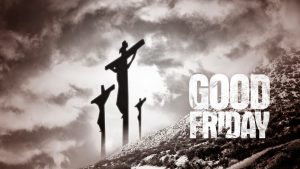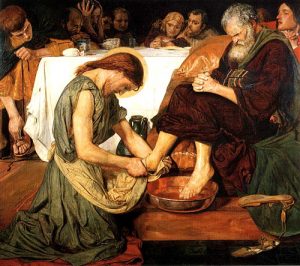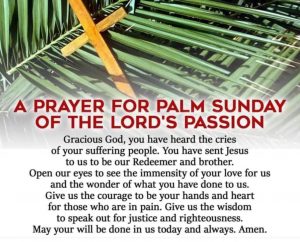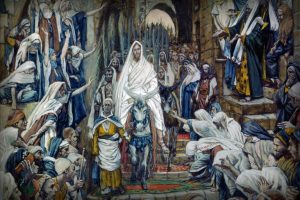Today the 7 speakers on the last words of Jesus will touch my heart with very powerful testimonies. This is the second day of our Triduum celebrations which we enter in prayer in the liturgical year. Good Friday draws us close to Christ’s suffering and to the suffering of others as well. Let us try to emerge into the whole liturgy of the Word, praying for the needs of the Church, with veneration and Holy Communion.
“Father, into your hands I commend my spirit,”are the last words of Jesus on the Cross in the gospel of Luke 23:46. At the darkest moment of fulfilling His mission for the salvation of men, He has chosen to enter into the deepest human uncertainty, and Jesus sharing our humanity cried out with surrender, trust and hope.
We believe that for Jesus, death is not the end. He promised us that He will rise, and indeed His glory comes in the Resurrection!
Brothers and Sisters, what do we want to surrender into God’s hands today?
First, we may find ourselves in a similar spiritual place as Jesus’ disciples on that Good Friday. Some were at the foot of the Cross, but the rest hid themselves out of fear and being anxious about who would be the next to be killed. Their future is uncertain without their master. How did they live as followers of Christ with that reality of death and forgetting His promise? I do believe that these disciples worked hard to re-learn to trust God, to understand every word they heard from Jesus. We are not far from the reality of the reaction of Christ’s disciples. Today we surrender to God our doubts and anxieties and re-discover our utmost love and trust of God.
Second, we may find ourselves lukewarm in our prayer or conversations with God. How often do we take the time to talk to God and ask for his help? How comfortable are we in praying? We need to have no fear in approaching the throne of grace to receive mercy and to find grace when we are in need of help. Jesus, even hanging on the Cross, has comforting words for us. I am afraid that many of us neglect our prayer life and stop talking to God. Are we afraid to ask for God’s help? Do we not realize that God wants to hear what is bothering us, to walk with us and bring us joy? God wants to know, so he can bestow His mercy, kindness, and grace on us, ease our burdens and make us better Christians. Let us deepen our prayer life throughout the year. We need to make it a habit to set aside 10, 15, or 20 minutes of quiet moments with God.
Third, today we focus on renewing and strengthening our faith, but we need to continue that effort beyond Easter. Equally as important is to thank Him for His endless love and being at our side, each and every day.
Today, I come to realize that Jesus’ suffering and death are God’s own entry into all that we suffer. Jesus fully understands and is in oneness with us as He continues to save and to change us.
As we “behold the wood of the cross, on which hung the Savior of the world,” we too embrace the whole mystery of love that the cross represents: First, the cross is about my personal infidelity and sins, my own selfishness. Secondly, we are the ones who have been guilty of transgressions and are now forgiven and loved. At the foot of the Cross is the mercy and compassion of God.
God bless you.
Fr. Arlon, osa
————————————
El Dictado del Corazón: Viernes Santo de la Pasión del Señor, Año A
- Isaías 52:13–53:12
- Salmos 31:2, 6, 12-13, 15-16, 17, 25
- Hebreos 4:14-16; 5:7-9
- Juan 18:1–19:42
Hoy, al mediodía, los 7 oradores de las últimas palabras de Jesús tocaron mi corazón con un testimonio profundo y se apoderaron de mi día. Este es el segundo día de nuestras celebraciones del Triduo al que entramos en oración en el año litúrgico. El Viernes Santo nos acerca al sufrimiento de Cristo y también al sufrimiento de los demás. Procuremos emerger en toda la liturgia de la Palabra, orando por las necesidades de la Iglesia, con veneración y la Sagrada Comunión.
“Padre, en tus manos encomiendo mi espíritu”, son las últimas palabras de Jesús en la Cruz en el evangelio de Lucas 23:46. En el momento más oscuro del cumplimiento de su misión para la salvación de los hombres, ha elegido adentrarse en la más profunda incertidumbre humana, y Jesús compartiendo nuestra humanidad clama con entrega, confianza y esperanza.
Creemos que para Jesús, la muerte no es el final. ¡Él nos prometió que resucitaría y ciertamente Su gloria viene en la Resurrección!
Hermanos y hermanas, ¿qué queremos entregar hoy en las manos de Dios?
Primero, podemos encontrarnos en un lugar espiritual similar al de los discípulos de Jesús en ese Viernes Santo. Algunos estaban al pie de la Cruz, pero otros se escondieron por miedo y por la ansiedad de quién sería el próximo en ser asesinado. Su futuro era incierto sin su Maestro. ¿Cómo vivieron como seguidores de Cristo con esa realidad de muerte y olvido de su promesa? Creo que estos discípulos trabajaron duro para volver a aprender a confiar en Dios y entender cada palabra que escucharon de Jesús. No estamos lejos de la realidad de la reacción de los discípulos de Cristo. Hoy entregamos a Dios nuestras dudas y angustias y redescubrimos nuestro máximo amor y confianza en Dios.
Segundo, podemos encontrarnos tibios en nuestras oraciones o conversaciones con Dios. ¿Con qué frecuencia nos tomamos el tiempo para hablar con Dios y pedir su ayuda? ¿Qué tan cómodos nos sentimos al orar? No debemos tener miedo de acercarnos al trono de la gracia para recibir misericordia y hallar gracia cuando necesitamos ayuda. Jesús, aun colgado en la Cruz, tiene palabras de consuelo para nosotros. Me temo que muchos de nosotros descuidamos nuestra vida de oración y dejamos de hablar con Dios. ¿Tenemos miedo de pedir la ayuda de Dios? ¿No nos damos cuenta de que Dios quiere escuchar lo que nos molesta, caminar con nosotros y traernos alegría? Dios quiere saber, para poder derramar Su misericordia, bondad y gracia sobre nosotros, aliviar nuestras cargas y hacernos mejores cristianos. Profundicemos nuestra vida de oración a lo largo del año. Necesitamos hacer que sea un hábito apartar 10, 15 o 20 minutos de momentos de tranquilidad con Dios.
Tercero, hoy nos enfocamos en renovar y fortalecer nuestra fe, pero necesitamos continuar ese esfuerzo más allá de la Pascua. Igual de importante es agradecerle por su amor infinito y por estar a nuestro lado todos los días.
Hoy me doy cuenta de que el sufrimiento y la muerte de Jesús son la entrada de Dios en todos los que sufrimos. Jesús comprende completamente y está en unidad con nosotros mientras continúa salvándonos y cambiándonos.
Al “contemplar el madero de la cruz, sobre el cual colgaba el Salvador del mundo”, abrazamos también todo el misterio de amor que representa la cruz:
Primero, la cruz se trata de mi infidelidad y mis pecados, mi egoísmo.
En segundo lugar, somos nosotros los que hemos sido culpables de transgresiones y ahora somos perdonados y amados.
Al pie de la Cruz está la misericordia y la compasión de Dios.
Dios los bendiga.
Padre Arlón, osa




